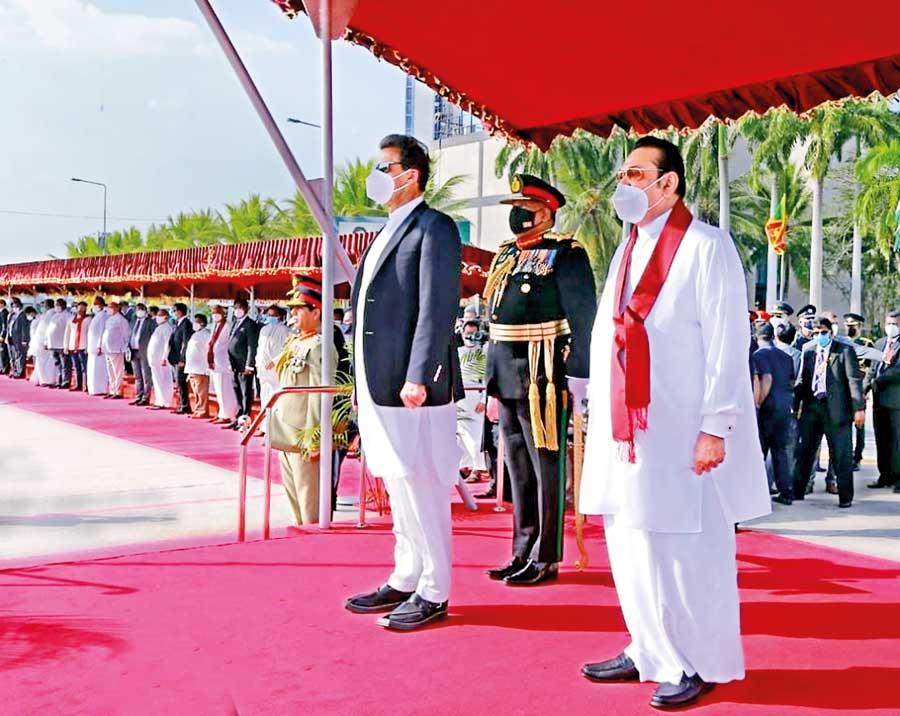Reply To:
Name - Reply Comment

With Prime Minister Imran Khan’s scheduled visit to Colombo, Sri Lanka on February 23, the Pakistani Prime Minister, will be the first Head of Government to visit Sri Lanka after the COVID-19 pandemic hit the nation last year. There seems to be an air of expectation for the renewal of relations covering trade, commerce, culture and defence matters between the countries. Relationships between the two governments have always been strong, however, during former Prime Minister Ranil Wickremasinghe’s term, efforts made by the Government of Pakistan was not paid much heed to. The optimism in the election of the new Government is depicted in the Prime Ministers official state visit to Colombo, which seems to be received with much interest for the maintenance of Sri Lanka and Pakistan’s cooperative relationship.
Minister, will be the first Head of Government to visit Sri Lanka after the COVID-19 pandemic hit the nation last year. There seems to be an air of expectation for the renewal of relations covering trade, commerce, culture and defence matters between the countries. Relationships between the two governments have always been strong, however, during former Prime Minister Ranil Wickremasinghe’s term, efforts made by the Government of Pakistan was not paid much heed to. The optimism in the election of the new Government is depicted in the Prime Ministers official state visit to Colombo, which seems to be received with much interest for the maintenance of Sri Lanka and Pakistan’s cooperative relationship.
On Sri Lanka’s independence on February 4, 1948, the founder of Pakistan, Quaid-e-Azam Mohammad Ali Jinnah aptly described the nature of Pakistan-Sri Lanka relations in his message: “Pakistan has the warmest goodwill towards Ceylon, and I am sanguine that the good feelings which exist between our people will be further strengthened as the years roll by and our common interests, and mutual and reciprocal handling of them, will bring us into still closer friendship.”
"The defence cooperation with Sri Lanka, China and Pakistan is likely to continue and strength in the years to come, if given the importance it deserves by the Government"
This friendship was depicted in 1971 during the civil war with India, when Sri Lanka provided transit and refueling facilities at Bandaranaike International Airport for Pakistan International Airlines (PIA) while on its way to East Pakistan, which later became Bangladesh as the airspace over India could not be accessed at that time. The Sri Lanka - Pakistan defence ties and military cooperation has always been a strong point where Pakistan supplied Sri Lanka with defence equipment and intelligence support in 2009 while Sri Lanka was engaged in the civil war with the Liberation of Tigers of Tamil Eelam (LTTE). Furthermore, considerable goodwill and mutual trust was created when Pakistan provided military training to Sri Lankan armed personnel at its premier defence colleges.
It is no surprise that it is Sri Lanka’s geographical location that has been advantageous for the country in maintaining such good relations with Pakistan and China. China is one of the biggest arms suppliers to Sri Lanka and is currently engaged in building a harbour in Hambantota. For Pakistan too ensuring the support of its neighbours in the region is crucial and it is evident that Pakistan greatly values its relations with China. This defence cooperation with Sri Lanka, China and Pakistan is likely to continue and strength in the years to come, if given the importance it deserves by the Government.
Sri Lanka also played an important role in the restoration of Pakistan to the Commonwealth, when in 2009 the Sri Lankan cricket team visited Pakistan despite security warnings that helped prevent Pakistan’s isolation in the field of international cricket.
"Sri Lanka played an important role in the restoration of Pakistan to the Commonwealth, when they toured Pakistan despite security warnings that helped prevent Pakistan’s isolation in the field of international cricket"
The Free Trade Agreement between the two countries was made operational in 2005, where Pakistan agreed to provide 100 % duty concession on 206 commodities and Sri Lanka waived duties on 102 items, and as such within two years of signing this agreement, both countries had seen a 27% increase in volume. Even during the current climate and post pandemic we encouragingly witnessed Spa Ceylon open stores in Pakistani markets which depicts that there is potential for exporting Ayurvedic products. These lucrative business ventures can help tilt the balance of trade to favour Sri Lanka.
SAARCLAW was established in Colombo on October 24, 1991 as a result of a bilateral arrangement of lecturing between educational institutes of Pakistan and Sri Lanka with 175 members of the legal community, including judges, legal practitioners and academics of the SAARC counties.
Recently, the Pakistan Alumni has been rekindled by the Pakistan High Commission in Sri Lanka which will greatly benefit the Sri Lankan citizens who have studied in Pakistan.
Pakistan also receives the biggest share of corneas from Sri Lanka, according to the Sri Lanka Eye Donation Society. In August 2019, a Sri Lankan delegation handed donations of 50 corneas to Prime Minister Imran Khan. This is extremely important for Pakistan as in Muslim countries it is generally forbidden to damage the human body before or after death and as such Sri Lanka is able to satisfy demand for the world-wide shortage of corneas. The Prime Minister had stated that Pakistan deeply values its close and friendly ties with Sri Lanka. Such generosity was also extended by the Government of Sri Lanka in 2011, where a group of twelve doctors from Sri Lanka visited Lahore to contribute their expertise to eradicate the dengue fever which was mainly problematic in the province of Punjab.
"The deep and multifaceted relationship between Pakistan and Sri Lanka should be revisited with a fresh perspective during the Prime Minister’s visit to re-strength their economic ties at a bilateral, regional and international level"
The deep and multifaceted relationship between Pakistan and Sri Lanka should be revisited with a fresh perspective during the Prime Minister’s visit to re-strength their economic ties at a bilateral, regional and international level. Since the re-election of President Rajapaksa, there is popular expectation that he will conduct a balancing act between the activities of India, China and Pakistan, while not being overly cautious by sidelining Pakistan. It remains to be seen whether there will be adequate media coverage upon the Pakistani Prime Ministers arrival to Sri Lanka and the outcome of this visit. The delegation accompanied by the Prime Minister consists of renowned Pakistani businessmen and the outcome of such state-level discussions may lead to MOUs being signed between the two countries that transpire into executed long-term agreements and arrangements between various sectors of the economies. Promotional campaigns and exhibitions are effective in creating awareness of the new investment opportunities that exist in Sri Lanka, along with providing businesses information on the concessionary or attractive interest rates offered by banks in Sri Lanka that can be availed bysuch businesses. The Governments of both countries indeed have a role to play as facilitators of trade; however, it is the private sector that is required to play a more crucial role to embark on the creation of joint ventures between the two countries by investing and engaging in bilateral trade.